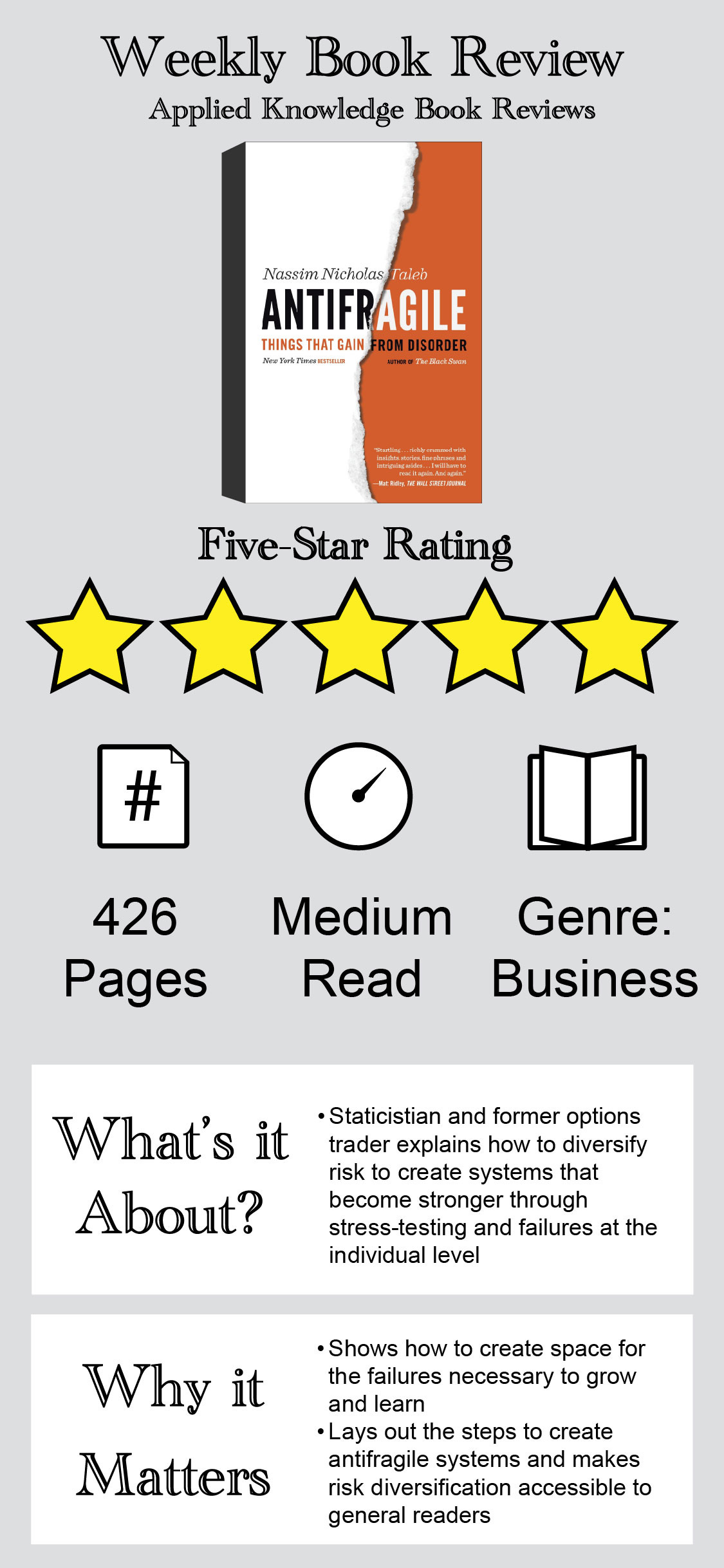How to Create Things that Get Stronger from Stress
Some systems can be undone by a single disaster, while others get stronger from stress-testing and adversity.
Often when disasters strike, entire systems are threatened. Tsunamis can wipe out communities that lack the infrastructure to deal with them. Mismanaged casinos can go bankrupt with one VIP winner. The chain of debt that funded mortgage-backed securities threatened the U.S. banking system.
However, other systems are not only resistant to catastrophe. Stresses make them stronger. When dictators try to suppress books and ideas, they often spread farther than they would have before they became forbidden and enticing.
In fact, books are one of Nassim Taleb’s best examples of antifragility. In his book Antifragile, Taleb describes the features of antifragile systems, drawing on his experience as a financial trader and later, an academic.
Individual Parts Sacrificed for the Greater Good
An anti-fragile system is one whose parts can fail and make the system stronger as a result. Taleb offers the example of the economy:
“For the economy to be anti-fragile and undergo what is called evolution, every single individual business must necessarily be fragile, exposed to breaking — evolution needs organisms (or their genes) to die when supplanted by others, in order to achieve improvement, or to avoid reproduction when they are not as fit as someone else. Accordingly, the antifragility of the higher level may require the fragility — and sacrifice — of the lower one.”
Consider the anti-fragility of a book like Maus, the graphic novel about the Holocaust. After a Tennessee school board banned it for “inappropriate words” and partial nudity, sales of the book increased 753% over the next year.
(This doesn’t work for all books, though. The same article profiled smaller authors who were part of bulk book bans whose careers have sustained long-term damage and no short-term sales spikes.)
Still, the individual success cases illustrate antifragility. Maus’ ban in one area made the book more popular in many other areas. The book became more popular after a local attack instead of more obscure.
Antifragility is a principle that’s useful for people looking to build more resilient teams or financial portfolios.
How to Create Something Antifragile
About halfway through his book, Taleb lists specific qualities that anti-fragile systems share:
“(i) Look for optionality; in fact, rank things according to optionality, (ii) preferably with open-ended, not closed-ended, payoffs; (iii) Do not invest in business plans but in people, so look for someone capable of changing six or seven times over his career, or more… ; … (iv) Make sure you are barbelled, whatever that means in your business.”
Optionality isn’t just about having multiple options. It’s about having options that expose you to great rewards, even if the chance of those large rewards is remote. It’s related to open-ended payoffs, which have the potential to be limitless rather than a smaller set amount.
Successful creative careers are great examples of optionality and open-ended payoffs. Consider Bari Weiss’ platform, The Free Press. It hosts ideologically diverse writers from progressive Brianna Wu to Trump-supporter Batya Ungar-Sargon. (Ungar-Sargon is a populist at heart, giving her common ground with Trump on key issues and complicating her political description.) The Free Press’ content is also available through writing and the publication’s podcast, Honestly. Finally, it’s hosted on Substack, which has made a special point not to deplatform controversial content.
Agree with its content or not, The Free Press is designed to enjoy continued subscriber growth, reach audiences through different media, and cover issues across the political horseshoe.
Flexibility and the Barbell Strategy
Flexibility is something that Taleb values in his third attribute of anti-fragility, but his barbelling metaphor requires explanation.
Taleb refers to a barbell strategy throughout his book, which is a risk portfolio with “two extremes, with nothing in the center.” It’s an approach with a baseline of safety to eliminate downside risk and a group of activities that take many small risks. No catastrophe can hurt the baseline of safety, and moderate risks aren’t discovered to have been incorrectly measured, as Taleb points out they often are.
(Remember, mortgage-backed securities were pitched as safe, stable investments when they were bundled together even though they were neither.)
The barbell strategy is the entrepreneur with a day-job approach. A job at the whiskey distillery pays the bills while the startup is risky but has the potential to succeed dramatically.
Antifragile has many lessons to impart to people who are in charge of companies, portfolios, or any system with many moving parts. The book also includes the myriad asides and philosophical musings that Taleb is known for — though whether you enjoy these will depend on how much you agree with his political and philosophical beliefs.


